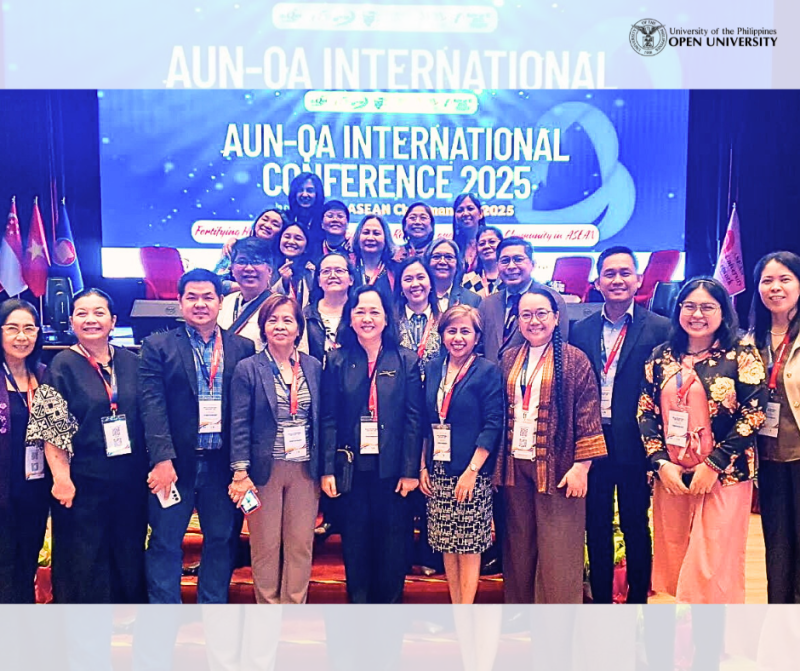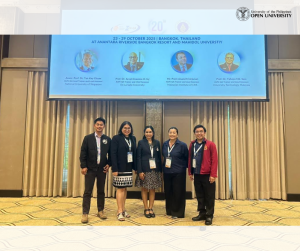
Asst. Prof. Ria Valerie Cabanes, Director of the UPOU Quality Assurance Office (second from front right), and Assoc. Prof. Aurora Lacaste, UPOU Vice Chancellor for Academic Affairs (first from front right), along with Prof. Alyssa Peleo-Alampay, Assistant Vice President for Academic Affairs (Quality Assurance) for the UP System (front center), and other UP System delegates, at the AUN-QA International Conference 2025 held at Universiti Malaya. Photo from UP Mindanao.
“Speed and quality must go hand in hand.” This was the reminder that Asst. Prof. Ria Valerie Cabanes brought home from the AUN-QA International Conference 2025, emphasizing that the University of the Philippines Open University (UPOU) must move faster and more intentionally, especially in shaping its microcredential policies, to remain relevant in a rapidly evolving educational landscape.
The AUN-QA IC 2025, held on 5-6 November 2025 at Universiti Malaya in Kuala Lumpur, Malaysia, explored the theme “Fortifying Higher Education: Strategic QA for Resilience and Institutional Immunity in ASEAN.” The event brought together over 400 QA experts and practitioners from 104 institutions, including the University of the Philippines (UP). Asst. Prof. Cabanes, Director of the UPOU Quality Assurance Office (QAO), attended the conference with UPOU Vice Chancellor for Academic Affairs, Assoc. Prof. Aurora Lacaste, and 22 other delegates from across the UP System. The gathering offered a platform to exchange insights on quality assurance trends, emerging policies, and strategies to strengthen higher education across the region.
One of the sessions that stood out for Cabanes focused on microcredentials. The discussion prompted reflection on UPOU’s internal guidelines and the broader policy environment.
“[T]he discussion made me pause and realise how much we still need to build,” she shared. “Microcredential QA is constantly evolving, and it reminded me that our policies should be just as agile.”
The session also highlighted the importance of partnerships with government, industry, other academic institutions, and learners. “[Q]uality only happens when everyone is aligned and working toward the same purpose,” Cabanes noted.
Cabanes was further inspired by the keynote, “From Global Voltage: Quality Assurance as the Driver of Institutional Resilience.” Prof. Dr. Olgun Çiçek’s insights on internationalization and strategic collaboration resonated with her ongoing research and the challenges facing higher education today.
“QA strengthens an institution’s ‘immune system,’” she relays. In a world with constant disruptions, “QA becomes more than a compliance tool; it becomes a way for higher education to stay resilient and responsive,” she added.
Reflecting on the conference, Cabanes emphasized the urgency of balancing speed and quality.
“We need to adapt our policies faster, roll out courses faster, align our internal processes faster, and build our teams’ capacities faster, not for the sake of rushing, but because the landscape is always shifting, all this without sacrificing quality,” she stressed.
Being a trailblazer, she explained, is about intentional leadership: “choosing excellence even when shortcuts are tempting, choosing collaboration because none of us can do this alone, choosing readiness because disruptions are now part of our reality, and choosing responsibility because learners have different needs now.”
Written by Maelyn V. Pisueña | Edited by Anna Cañas-Llamas











